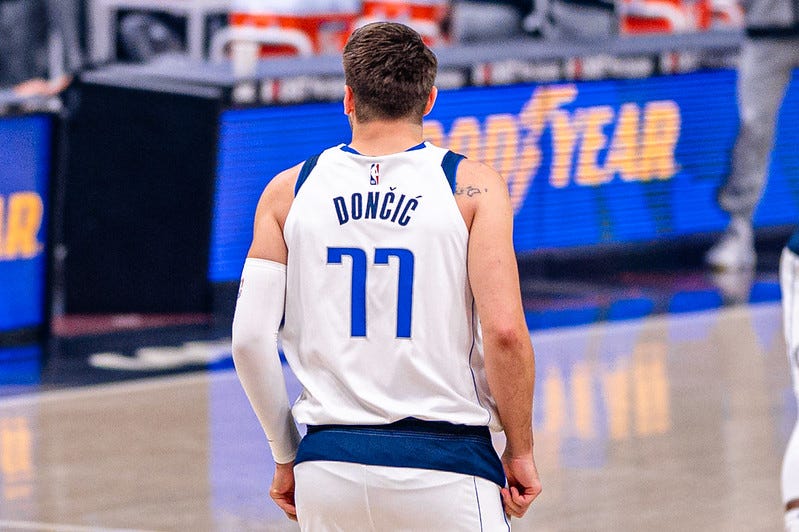The Luka Trade and The Peril of Emotional Decision-Making
Analyzing a shocking move in the NBA and what even non sports fans can learn
Luka in a Laker’s jersey? Two weeks ago, this would have been unthinkable, not only to the millions of devoted Dallas Mavericks fans living in the DFW metroplex here in Texas but to the millions of NBA fans worldwide. So unthinkable that when NBA insider Shams Charania tweeted out the news of the trade, I, along with almost everyone else, assumed his account had been hacked.
But it was real. If you are reading this and you are not a sports fan and have zero idea what I’m talking about, please bear with me. There is a lesson here for you. Let me explain. Luka Doncic, a Slovenian basketball player, is arguably one of the top three basketball players in the world. He’s beloved by fans of the Dallas Mavericks, who saw him as the heir to Hall of Famer Dirk Novitski, who has a statue outside of the American Airlines arena in Dallas and is one of the most celebrated former athletes in the metro area. Doncic is the type of player that NBA teams dream of having when they draft players out of college or from overseas.
In other words, the type of player you don’t trade. Unless you get a massive haul of draft picks and good players in return. And then you still probably don’t do the trade. It’s not that great NBA players don’t get traded. But rarely do they get traded in the prime of their careers and for such a low return.
Why did Dallas do this? As soon as the trade was executed, information began leaking out to various sportswriters about Luka’s famously bad workout habits and diet. Luka reported to training camp last fall out of shape and quickly got injured and hadn’t been playing for several weeks. The Mavericks, sensing the fan anger at the trade, continued to trash Luka—the star they’d built their franchise around and had been praising publicly until very recently—as entitled, out of shape, and a problem.
Those concerns were very real. Luka needed to make adjustments and take his conditioning seriously. But again, this was the man who led the Mavericks to the NBA finals last year. Certainly, this could have been worked out, right?
But the real story, behind the scenes, seems to be that the general manager of the Mavericks, Nico Harrison, had a falling out with his star. It seems over the course of the winter, the relationship had gotten worse. Recently, the team was sold. Mark Cuban, the extroverted superfan owner, was no longer in the decision-making circle. A new owner, with ties to gambling interests and less attached to Luka and the NBA in general, is in charge. Harrison seems to have made this decision on his own, without consulting Mark Cuban, who is largely responsible for the teams’ renaissance over the last couple of decades. Over the weekend, it came out that Cuban tried to stop this deal but was notified too late. He even publicly said he disagreed with it.
Harrison made the move in isolation, fueled by resentment, without consulting people who might have given him good counsel and advice. Now, the star Dallas traded for in return, Anthony Davis, is out for several weeks with his own injury. They traded a 25-year-old star who sometimes gets injured for a 31-year-old star who gets injured even more. Make it make sense. Nico and the owners keep doubling down, digging the hole further and alienating themselves even more from their fans. It’s an ugly situation. And completely unavoidable.
Whether or not you are a sports fan like me, there is an important lesson to be learned from this move: never make major decisions from pure emotion. The worst decisions I’ve ever made were when I was either angry or euphoric when I let a rush of adrenalin cloud my judgment. I’ve seen this dynamic up close with leaders I’ve worked with. The worst, career-defining, life-altering mistakes are made when resentment is lingering in the back of the mind and when those who might offer a wise perspective are shut out of the process. Nico Harris had Mark Cuban on speed dial. Why not call him? Could be because he knew the person who built this team would have talked some sense into him?
Anger, resentment, and frustration often crowd out wisdom. It doesn’t mean these aren’t important, God-given emotions. It’s good and right to express them, to work through them. We are humans, not stoics. But while we are in the heat of these feelings, we should take away our decision-making keys. Wait until you’ve cooled down and have had time to talk to wise folks who can shed light on your situation. Let cooler heads—not your own—prevail.
Otherwise, reacting, choosing, and acting out of pure emotion can cause damage. Poor decisions. Fractured relationships. Damaged reputations. This is true in parenting, organizational leadership, and political life.
I’ve not always done this well, but I’ve made it a personal rule to not make a major decision when I’m angry. I allow myself time to process through the emotion before I land on a choice. I try to seek the counsel of friends who know me and have expertise in the field.
Being wise doesn’t mean you can’t make quick decisions. It does mean what informs those decisions is wisdom and not endorphins.
Proverbs 14:29 says, “A patient person shows great understanding, but a quick-tempered one promotes foolishness.”
A few notes:
We are approaching Easter. You might find my book, The Characters of Easter helpful.
Check out this piece at Baptist Press on the wisdom of the President’s new transgender executive order.




